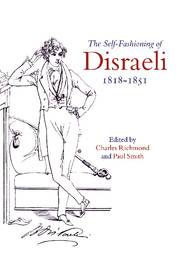Book contents
- Frontmatter
- Contents
- List of contributors
- Preface
- Introduction
- 1 Disraeli's education
- 2 Disraeli's romanticism: self-fashioning in the novels
- 3 Disraeli's crucial illness
- 4 Disraeli and orientalism
- 5 ‘A Hebrew to the end’: the emergence of Disraeli's Jewishness
- 6 Disraeli's interpretation of English history
- 7 Disraeli's politics
- Notes
- Index
5 - ‘A Hebrew to the end’: the emergence of Disraeli's Jewishness
Published online by Cambridge University Press: 19 March 2010
- Frontmatter
- Contents
- List of contributors
- Preface
- Introduction
- 1 Disraeli's education
- 2 Disraeli's romanticism: self-fashioning in the novels
- 3 Disraeli's crucial illness
- 4 Disraeli and orientalism
- 5 ‘A Hebrew to the end’: the emergence of Disraeli's Jewishness
- 6 Disraeli's interpretation of English history
- 7 Disraeli's politics
- Notes
- Index
Summary
Benjamin Disraeli's character consistently provoked strong reactions, often at violent odds with each other. For some, he was a vulgar, cynical careerist; for others, a visionary, patriotic statesman. Few were indifferent. Amid the welter of conflicting assessments, however, there was one point on which both admirers and detractors agreed: Disraeli was a Jew and being Jewish was central to his self-understanding – despite the fact that he had been baptized at the age of twelve. As one of his earliest biographers, James Anthony Froude, concluded, ‘At heart he was a Hebrew to the end.’ But to conclude that being Jewish mattered to Disraeli does not speak to the question of how it mattered or in what sense ‘he was a Hebrew’. It does not explain the meaning or content of Disraeli's Jewishness and its function in his emotional and political life.
In accounts of Disraeli's Jewishness, there has been little consensus. Historians and biographers have labelled him, variously, a proto-Zionist, a marrano, a racist, a proud Jew and a self-hating Jew. The truth is that none of these labels captures the complex, ambivalent character of what being Jewish meant to Disraeli at different times in his life. Indeed, it is this last point – the timebound rather than timeless character of his Jewishness – that needs to be stressed. For Disraeli, consciousness of being a Jew changed over time. It was not a fixed cultural or biological inheritance but, rather, an awareness and understanding that emerged and evolved over several decades, in response to external changes in his life, and stabilized only when he was in his forties.
- Type
- Chapter
- Information
- The Self-Fashioning of Disraeli, 1818–1851 , pp. 106 - 130Publisher: Cambridge University PressPrint publication year: 1999



